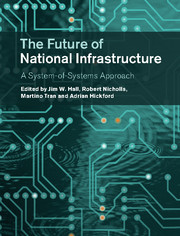Book contents
- The Future of National InfrastructureA System-of-Systems Approach
- The Future of National Infrastructure
- Copyright page
- Contents
- Contributors
- Preface
- Part I A system-of-systems approach
- Part II Analysing national infrastructure
- 3 Future demand for infrastructure services
- 4 Energy systems assessment
- 5 Transport systems assessment
- 6 Water supply systems assessment
- 7 Wastewater systems assessment
- 8 Solid waste systems assessment
- 9 Digital communications and information systems
- Part III Integrative perspectives for the future
- Index
- References
9 - Digital communications and information systems
from Part II - Analysing national infrastructure
Published online by Cambridge University Press: 05 February 2016
- The Future of National InfrastructureA System-of-Systems Approach
- The Future of National Infrastructure
- Copyright page
- Contents
- Contributors
- Preface
- Part I A system-of-systems approach
- Part II Analysing national infrastructure
- 3 Future demand for infrastructure services
- 4 Energy systems assessment
- 5 Transport systems assessment
- 6 Water supply systems assessment
- 7 Wastewater systems assessment
- 8 Solid waste systems assessment
- 9 Digital communications and information systems
- Part III Integrative perspectives for the future
- Index
- References
- Type
- Chapter
- Information
- The Future of National InfrastructureA System-of-Systems Approach, pp. 181 - 202Publisher: Cambridge University PressPrint publication year: 2016
References
- 2
- Cited by

